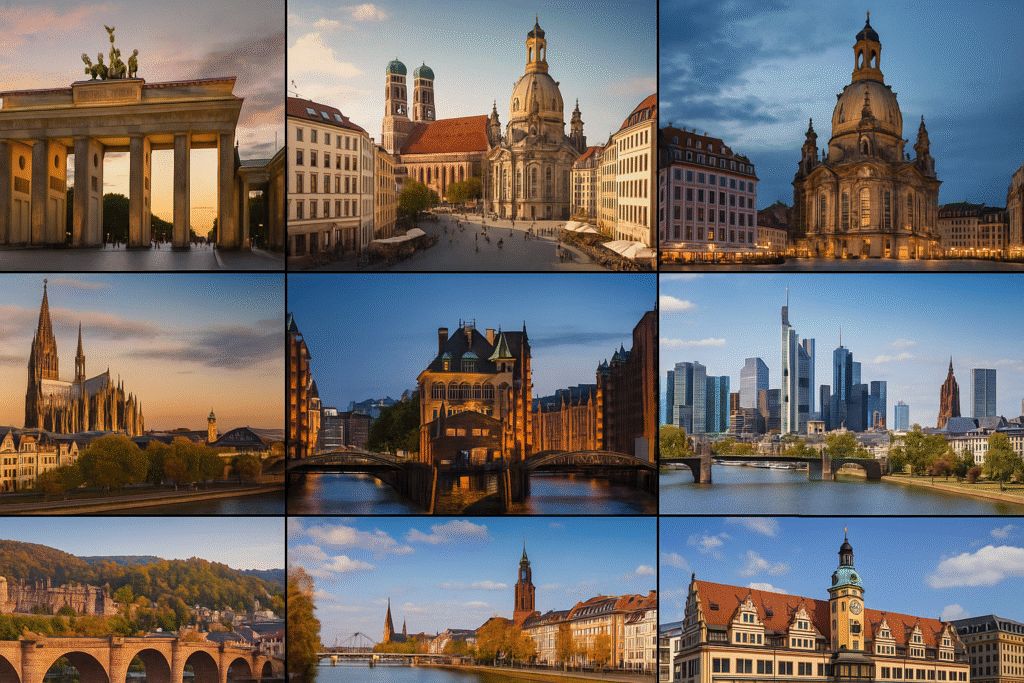Choosing where to study in Germany can feel overwhelming. I get it, you’re not just picking a university, you’re choosing a home for the next few years of your life. After talking to hundreds of international students and living in Germany myself, I’ve put together this guide to help you find the city that actually fits your personality and goals.

Before we dive into the cities, if you’re wondering about the actual application process to German universities, I’ve created a comprehensive video guide that walks you through everything from bachelor’s to PhD applications:
Apply to German Universities Yourself 2025 | Bachelor, Master, PhD
Now, let’s explore where you might want to spend those student years.
1. Munich: Worth the Splurge?
Let’s start with the heavyweight. Munich consistently tops every “best places to study” list, and honestly, there’s a reason for that. Walking through the city feels like you’re in a postcard, the Alps backdrop doesn’t hurt either.
The universities here, especially TU Munich and LMU, have serious global recognition. Your professors often have direct industry connections, and the research opportunities are incredible. I know students who landed internships at BMW or Siemens just through their university networks.
But here’s the reality check: Munich is expensive. We’re talking about €1,100 a month before you even think about rent. And finding housing? That’s a full-time job in itself. The competition is fierce because everyone wants to be here.
Still, if you can swing it financially, Munich offers something special. The job market is robust, the city is safe, and you’re an hour from world-class skiing. For many students, it’s worth eating ramen for a few months to experience what Munich offers.
2. Berlin: The City That Never Gets Old
Berlin is… well, it’s Berlin. There’s no other city quite like it. If you thrive on energy, diversity, and a bit of organized chaos, this is your place. The city has this incredible ability to reinvent itself constantly, which makes it endlessly fascinating for students.
With 40 universities and research institutions, you’ll never lack academic options. Humboldt University has produced 29 Nobel Prize winners, while the Free University excels in social sciences and humanities. The startup scene is exploding, creating opportunities in tech, media, and creative industries.
Living costs hover around €1,000 monthly excluding rent, which is reasonable for a capital city. The nightlife is legendary, the cultural scene is unmatched, and you’ll meet people from every corner of the globe.
The downside? Berlin can be intense. The bureaucracy will test your patience, finding housing is competitive, and the pace can overwhelm quieter personalities. But if you want to be where history, technology, and creativity collide daily, Berlin delivers.
3. Hamburg: Germany’s Cool Northern Cousin
Hamburg surprised me. I expected a port city focused purely on logistics, but found something much more interesting. The city has this relaxed confidence that’s hard to find elsewhere in Germany. Maybe it’s all those canals and waterways, or the fact that you can smell the sea air.
Career-wise, Hamburg is solid gold. The media industry is huge here many German publications and TV stations have headquarters in the city. The IT sector is booming, and the port creates endless opportunities in international business and logistics.
The University of Hamburg is excellent, particularly for media studies, international business, and marine sciences. With 20 universities total, you’ll have plenty of academic options.
Yes, it rains more than other German cities, and yes, it’s a bit pricey at around €1,000 monthly. But Hamburg offers something unique: a big-city vibe without the big-city stress. Plus, weekend trips to Denmark or the Netherlands are incredibly easy.
4. Cologne: Where Everyone Becomes Your Friend
Cologne has this magical quality—within weeks, you’ll feel like a local. The people here are genuinely welcoming, which makes the adjustment period much smoother for international students. The cathedral is stunning, sure, but what really makes Cologne special is its human scale.
The University of Cologne is one of Germany’s largest and oldest, with particularly strong programs in business, economics, and social sciences. The city also hosts numerous art schools and technical universities, creating a diverse academic ecosystem.
Career opportunities span media, arts, education, and services. Several major German companies have headquarters here, and the central location makes it easy to network across the country.
Living costs around €1,000 monthly are manageable, though rents have been climbing. The trade-off is worth it for most students you get urban amenities with a community feel that’s hard to find in bigger cities.
5. Frankfurt: Mini Manhattan with German Engineering
Frankfurt looks nothing like the rest of Germany, and that’s intentional. This is where deals get made and careers get launched. The European Central Bank, German Stock Exchange, and countless multinational corporations create opportunities you won’t find elsewhere.
For students in finance, economics, or business, Frankfurt is unbeatable. The practical experience opportunities are incredible many students work part-time at banks or consulting firms while studying. Goethe University has strong programs in business and economics, with professors who often consult for major firms.
The international community is huge, making it easier to adjust as a foreign student. The airport connects you to anywhere in the world, which is perfect for maintaining connections back home.
Expect to spend around €1,100 monthly, and be prepared for a fast-paced environment. Some areas near the train station can feel sketchy at night. But if you’re serious about a career in finance or international business, Frankfurt offers unmatched opportunities.
6. Stuttgart: Innovation Capital
Stuttgart doesn’t get the attention it deserves. While everyone talks about Berlin and Munich, Stuttgart quietly became one of Europe’s most important innovation hubs. Mercedes-Benz, Porsche, Bosch—the biggest names in German engineering are based here.
The University of Stuttgart excels in engineering, computer science, and natural sciences. The connections to industry are incredible many professors split time between academia and corporate research. Internships at major corporations are common, often leading to job offers upon graduation.
What surprised me most about Stuttgart is how green it is. The city sits in a valley surrounded by vineyards and forests. You can study cutting-edge robotics in the morning and hike through beautiful countryside in the afternoon.
Living costs around €1,100 monthly reflect the city’s prosperity, but salaries after graduation often compensate. If you’re passionate about engineering or technology, Stuttgart offers the perfect blend of academic excellence and practical opportunity.
7. Leipzig: The Underrated Creative Hub
Leipzig has this infectious energy that’s hard to describe. Maybe it comes from being a historically important cultural center, or maybe it’s just the large student population, but the city buzzes with creativity and possibility.
The University of Leipzig, founded in 1409, offers excellent programs in humanities, medicine, and social sciences. The city also hosts several music conservatories and art schools, creating a diverse intellectual environment.
Living costs of around €980 monthly make Leipzig one of Germany’s most affordable university cities. The nightlife is fantastic, the music scene is incredible, and you’ll never lack for cultural events.
The main drawback is limited job opportunities compared to larger cities. Many students love Leipzig so much they struggle to leave after graduation, but career options can be narrow. Still, for students prioritizing academic experience and cultural richness over immediate career prospects, Leipzig is hard to beat.
8. Dresden: Beauty Meets Brains
Dresden is stunning—there’s no other way to put it. The baroque architecture, the Elbe River setting, the careful reconstruction after World War II walking through the old town feels like touring a living museum.
TU Dresden is one of Germany’s strongest technical universities, particularly in engineering, computer science, and natural sciences. The research opportunities are excellent, and the student-to-professor ratios are often better than at larger universities.
Living costs around €990 monthly are reasonable, and the quality of life is exceptional. The city feels safe and manageable, with excellent public transportation and nearby outdoor recreation opportunities.
The challenges? You’ll need German language skills to fully integrate into local life. Job opportunities, while growing, remain more limited than in larger cities. But if you value a beautiful, peaceful environment for focused study, Dresden delivers.
9. Aachen: Small City, Big Opportunities
Don’t let Aachen’s size fool you, his city punches way above its weight academically. RWTH Aachen University consistently ranks among Europe’s top technical universities, particularly for engineering and technology.
The student community is tight-knit and international, making it easy to form lasting friendships. Living costs around €970 monthly are among Germany’s lowest, and the proximity to Belgium and the Netherlands adds international flair.
The location creates unique opportunities many students do internships or research projects across borders. The multilingual environment is excellent preparation for international careers.
Local job opportunities are limited, so many graduates relocate after finishing their studies. But for pure academic experience in engineering or technology, Aachen is exceptional.
10. Heidelberg: Academic Paradise
Heidelberg University, founded in 1386, carries serious academic prestige. Walking through the old town, with its castle ruins and riverside setting, you understand why this place has inspired scholars for centuries.
The university maintains its reputation through rigorous academic standards and world-class research opportunities. Many programs, particularly in humanities and sciences, attract top professors and students globally.
The city itself is intimate and student-friendly, with reasonable living costs around €1,000 monthly. Safety is excellent, and the beautiful setting makes studying here feel like a privilege rather than just education.
The main limitation is career opportunities—Heidelberg is primarily an academic town. Many students pursue graduate studies or relocate for career opportunities. But if you’re focused purely on academic achievement in a inspiring environment, Heidelberg is unmatched.
Making Your Choice
Here’s what I’ve learned from talking to hundreds of international students: the “best” city depends entirely on what you want from your German experience.
Choose Munich or Frankfurt if career opportunities and prestige matter most to you. Pick Berlin if you want energy and diversity. Consider Hamburg for a balanced urban experience. Go with Cologne if community matters more than anything else.
For pure academic focus, Heidelberg or Aachen might be perfect. If you want affordability with culture, Leipzig is hard to beat. Dresden offers beauty and strong academics, while Stuttgart combines innovation with quality of life.
The most important thing? Trust your instincts. Visit if possible, talk to current students, and imagine yourself living there for several years. The right city will feel right, even if it wasn’t your original first choice.
Germany offers incredible educational opportunities regardless of which city you choose. The differences lie in lifestyle, community, and what you want your daily life to look like while you’re building your future.
Once you’ve decided on your ideal city, the next step is actually getting accepted. The application process can be tricky to navigate alone, but it’s absolutely doable with the right guidance. Check out my detailed walkthrough on applying to German universities yourself – it covers everything from document preparation to avoiding common mistakes that can derail your application.
Ready to start your German education journey? Research visa requirements, application deadlines, and language requirements early—the process takes time, but the experience is worth every bit of effort.


